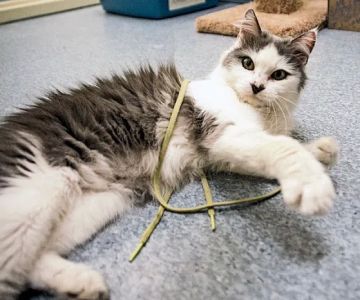Unlocking Better Health for Pets Through Nutritional Counseling
As a devoted pet parent living in the U.S., I’ve always believed in giving my furry companions the best life possible. I brushed their coats, played fetch at the park, kept their vaccinations up to date, and gave them plenty of love. But one area I didn’t think much about—until it became a pressing issue—was their nutrition. That’s when I discovered the transformative power of nutritional counseling for pets.
1. Understanding What Pet Nutritional Counseling Really Means
Pet nutritional counseling isn’t just about picking the most expensive bag of kibble off the shelf. It’s a science-backed approach to feeding pets in a way that aligns with their breed, age, weight, health conditions, and lifestyle. Veterinarians and certified pet nutritionists assess everything from allergies to digestive health to create a personalized diet plan.
After my senior Labrador, Max, began showing signs of lethargy and weight gain, I booked a nutritional consult at a local clinic. The vet discovered he had early-stage kidney issues, something I never would’ve linked to diet. With the right changes to his food—low-phosphorus, high-moisture formulas—Max regained energy and showed marked improvement within weeks.
2. Why One-Size-Fits-All Diets Don’t Work for Pets
It’s tempting to assume that every pet can thrive on generic pet food. But like humans, animals have individual dietary needs. A high-protein diet may be great for an active working dog, but not for a senior cat with liver disease. That’s why professional guidance is so important.
Take Bella, a feisty Siamese cat owned by a close friend. Bella suffered from recurring urinary tract infections (UTIs). Her vet recommended a special urinary formula diet, paired with increased water intake strategies like a pet fountain. Bella's UTIs stopped completely after switching her nutrition plan—no more costly emergency vet visits or antibiotics every few months.
3. Nutritional Counseling for Different Life Stages
3.1. Puppies and Kittens
Young pets need diets that support growth, immune development, and strong bones. Nutritional counseling ensures they receive the right balance of calcium, DHA, and quality proteins. Improper feeding at this stage can cause developmental problems later on.
3.2. Adult Pets
Once pets hit adulthood, maintaining a healthy weight becomes the focus. Nutritional experts guide pet owners on portion control, calorie balance, and meal timing—often preventing obesity-related diseases like diabetes and arthritis.
3.3. Senior Pets
Aging pets often suffer from joint pain, organ deterioration, or metabolic changes. Customized diets, often involving supplements like glucosamine or omega-3s, can reduce symptoms and increase quality of life. Nutritional counseling ensures you’re not over- or under-supplementing.
4. Dealing with Chronic Conditions Through Diet
Pets with diabetes, allergies, heart issues, or digestive disorders require precise nutritional interventions. A vet nutritionist can recommend specialized diets to control blood sugar, reduce inflammation, or improve gastrointestinal health.
For example, my neighbor’s dog, Charlie, struggled with severe skin allergies. After working with a nutritionist, they identified chicken as the culprit—something she would never have suspected. A novel protein diet using duck and pea resolved his itchiness and ear infections within months.
5. Behavioral Benefits of Nutritional Counseling
Believe it or not, what your pet eats can affect how they behave. Diets deficient in nutrients like B-vitamins or amino acids can lead to anxiety, aggression, or hyperactivity. Balanced nutrition promotes calmer behavior and improves focus, especially in training scenarios.
I noticed a huge difference in Max once his new diet stabilized. He went from being restless and whiny at night to peacefully sleeping through until morning. His coat even became shinier, a bonus I hadn’t expected!
6. How to Know If Your Pet Needs Nutritional Counseling
- Your pet is overweight or underweight.
- They suffer from frequent digestive issues or allergies.
- You have a senior pet or a pet with a chronic illness.
- They show changes in behavior or energy levels.
- You’ve recently adopted a rescue pet with an unknown background.
If any of these apply to your furry friend, I strongly encourage reaching out to a professional. We found the perfect clinic through Hidden Brook Veterinary, where the vets worked hand-in-hand with us to monitor Max’s progress and tweak his plan as needed.
7. Making the Most of Your Pet’s Nutritional Counseling Session
Here are a few tips from my experience:
- Keep a food diary: Log what your pet eats daily for a week before your appointment.
- Track symptoms or changes: Behavior, weight, stool consistency—these are all vital clues.
- Bring all medical records: These help the vet form a complete picture.
- Be honest: Don’t worry about judgment—if you give treats or human food, say so!
And most importantly, be open to change. The right nutrition plan may not be what you expected, but it can be a game-changer for your pet’s life.
8. Why More Pet Owners in the U.S. Are Turning to Nutrition Experts
From New York to California, awareness of pet wellness is growing. More owners now view their animals as family members who deserve tailored care. With the rise in chronic pet diseases and increasing lifespans, nutritional counseling is no longer a luxury—it’s a necessity.
Personally, I can’t imagine going back to the days of guessing which food was best. The knowledge I’ve gained has helped me feel empowered, not confused. And the improvements in Max’s health? That alone made it worth every penny.
If you're considering it, I highly recommend checking out services like those offered at Hidden Brook Veterinary. They’re not just treating pets—they’re transforming lives, one bowl at a time.












